Ex-detective risks life to fight crime in war zones
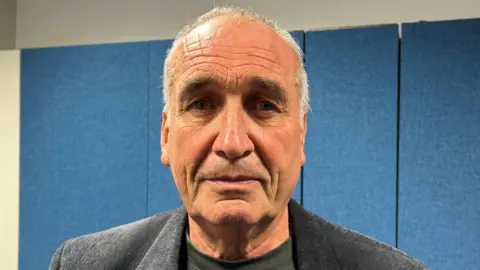 BBC
BBCA former British police officer who once led an operation against child grooming gangs has spent more than a decade fighting serious organised crime in some of the most dangerous countries in the world.
Alan Edwards has led operations in countries including Kosovo, Nigeria, Sudan and Somalia.
In that time he has arrested major criminals in armed operations, evacuated his team under gunfire and tackled the trafficking of thousands of women into Europe.
Asked what linked his work, he said: "All of it relates to looking after victims; all of it relates to identifying and looking at how we can investigate these types of crimes; all of it goes back to politics and countries in turmoil and conflict."
While working for West Mercia Police, Mr Edwards led an investigation in Telford which resulted in the jailing of seven men in 2012.
It was one of the first cases of its kind, and Mr Edwards said he was later consulted as the police started to investigate similar cases of child sexual exploitation elsewhere in the country.
After the operation, he took on a superintendent role but said: "It wasn't really where I needed to be at that time."
Previously, he had worked in the Netherlands, the United States and Turkey, so he began searching for another international posting.
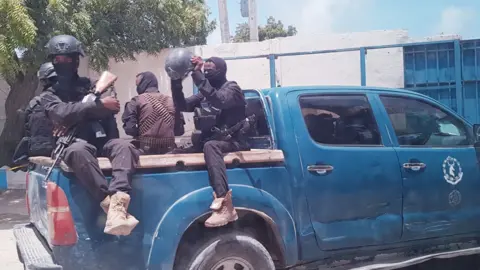 Alan Edwards
Alan EdwardsIn 2013, he landed a job with the EU mission to Kosovo.
He said: "I was running an armed unit with detectives from 20 different nationalities dealing with corruption, terrorism and organised crime."
Although the Kosovo war was long since over, he said the country was still in a "post-war stage", and there were people fighting for "land, money and power".
Within six weeks of arriving in Pristina, he led an operation to capture "one of the top narcotics kingpins in the world".
"We arrested him at gunpoint in the streets of Pristina, so we were doing some major work; we were taking out some top criminals," he remembered.
His final operation in Kosovo, in 2016, involved a team of 350 armed officers arresting a man believed to be behind up to 800 political assassinations.
"That night I went to bed with my gun under my pillow because I expected some sort of feedback," he said.
Then he got a surprise he was not expecting.
He recalled: "My wife suddenly turns up in Pristina, surprising me to say, 'Hello, I've popped over for the week.'
"Of course then she's wondering why I've got the gun next to the bed and everything..."
But he found his appearances on television to talk about the operation had given him celebrity status.
When the couple went out into Pristina, he said: "Everybody's coming out and offering me free meals and free haircuts and God knows what."
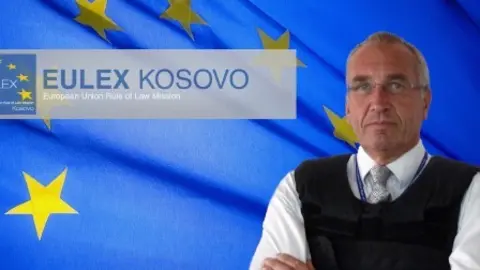 Alan Edwards
Alan EdwardsAfter officially retiring from the police in 2016, he went to work in Sudan.
Mr Edwards said: "With the movement of people out of Africa, across the Mediterranean and into Europe, we knew that we had to do something."
His role was to "disrupt and dismantle" organised crime gangs, and over the next four years, his team shared more than 180 intelligence reports with Interpol, leading to the arrest of a number of major human traffickers.
But it was also a dangerous job, and in 2019 he said a revolt led to armed men going on the streets "running around with Ak47s, and shooting everywhere".
He said: "I looked out of our office one day, and the police had set up a machine gun post directly outside our office to protect us."
His team was then warned it would have to evacuate quickly.
He said: "I got our team out in two vehicles, and we managed to escape driving through the streets, even though we were being shot at with AKs."
Mr Edwards said life in Sudan had been "very fraught", but it was now in a "terrible situation".
In April 2023, a conflict began between the Sudanese army and a powerful paramilitary group.
Mr Edwards said: "Where I used to stay is all blown up, and a lot of the people I worked with out there have suffered terribly."
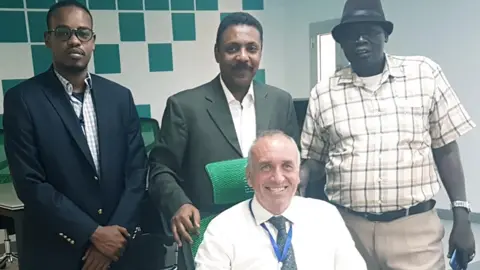 Alan Edwards
Alan EdwardsIn Nigeria, Mr Edwards helped combat Boko Haram.
He explained: "The military deal with terrorism out there," including the kidnapping of schoolchildren.
But he said they were "not quite skilled in how to gather evidence in the field", so he helped teach them to collect "battlefield evidence" and then bring it before a court.
He also spent time working with the UN in Somalia, which he said was "always a very difficult place to work".
Again, he was dealing with human trafficking, but this time it was people from Ethiopia and Djibouti being taken across Africa through Somalia.
He said some were being radicalised by Islamic terrorist groups in Somalia and were kept to be "part of the turf wars between various terrorist groups".
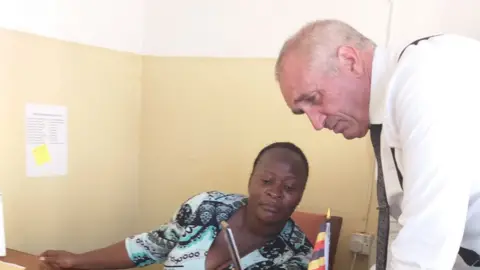 Alan Edwards
Alan EdwardsMost recently, Mr Edwards has been working in Fiji, which he said had "suddenly found it is right at the heart of a lot of transnational organised crime".
He said Mexican and Chinese criminals were using Fiji, Tonga and Samoa as "trans-shipment points" to import methamphetamines into Australia and New Zealand.
His job had been to train police there to investigate transnational organised crime.
Despite the dangers, he said his wife back in England had supported him all the way, and he would continue "for a couple more years yet".
After that, he said: "I'll hang up my boots, and then I'll go and ride my motorbike and retire."
Follow BBC Shropshire on BBC Sounds, Facebook, X and Instagram.
